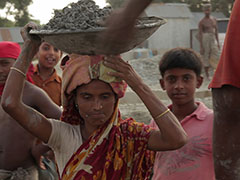MOTIVATION
In 1998, Bangladesh was hit by "the flood of the century," a natural disaster that led to a shortfall in rice production and, subsequently, a dire food shortage. Policy makers sought ways to make food more readily available in the short term and to better manage public food grain stocks in the future. IFPRI conducted a study of the impacts of the flooding by evaluating both household coping mechanisms and recovery rates in addition to examining how effectively national food distribution programs targeted food aid to those in greatest need.
RESULTS AND OUTCOMES
- Results showed that the poorest people in the country coped with the floods by acquiring loans from the private sector in addition to accepting food transfers from government programs and nongovernmental organizations.
- Responding to the government’s need for timely, practical policy analysis in the midst of the floods, IFPRI staff members and collaborators from the Food Planning and Monitoring Unit of the Ministry of Food and Disaster Management produced 53 policy advisory memos from 1998 to 2001. These memos offered ready input into current policy decisions needed to respond to the impacts of the flooding.
- The project’s recommendations contributed to the Bangladeshi government developing a policy that maintained affordable rice prices by enabling the import of approximately 2 million metric tons of private sector rice. In addition to stabilizing food markets, this policy contributed to the prevention of famine.
For more information on IFPRI's research and partnerships in Bangladesh, please go to this brochure.



